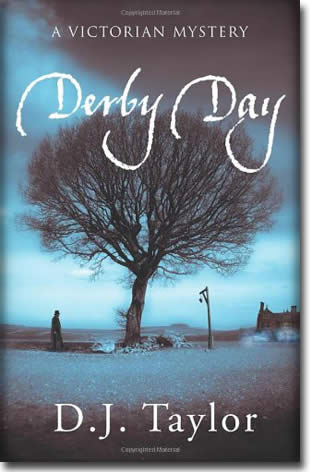 Reading the Longlist:
Reading the Longlist:
Toying With a
Victorian Detective
Derby Day
by D.J. Taylor
Review by Matthew Gallaher
Toward the end of Derby Day, Mr. Glenister wonders what disturbs him more: that a swindling upstart coerced his long-time friend and fellow country squire into giving up his estate or that “something longstanding [. . .] should not be lightly broken up.” D.J. Taylor seems to smile and wink at this second concern regarding permanence and inheritance. He toys with several traditional elements of the nineteenth century detective novel without ever risking the genre's overall familiarity and charm.
Of course, Victorian England is well-trodden terrain for Taylor, who has written a finely researched biography on Thackeray as well as an earlier novel set in the same decade. His latest “Victorian mystery” once again proves his ease and fluency in the prim mannerisms and vernacular of the Victorian era.
The novel opens with a well-meaning but aging lawyer yearning to connect with his aloof and spoiled daughter, Miss Gresham. Miss Gresham's suitor, Happerton, a notorious horse-betting rake, exploits this familial rift in order to further his own money-making schemes, and his obsession for horses and greed eventually infects the rest of the novel's cast. Before long, each character's fortune becomes intertwined with the fate of Tiberius, a race-horse named after a Roman emperor famous for two things: conquering, and then falling into a deep, reclusive depression.
Taylor clearly enjoys playing with our expectations about what exactly constitutes Victorian detective fiction. He hangs a quotation at the top of each chapter from a variety of writers of the time in order to whimsically comment on any given element of the story. Perhaps most memorably, he enlists none other than Thackeray himself to describe the bewitchingly “quaint” and “meek” scenery of Scroop, a village outside of Lincolnshire. The narration is strangely lighthearted even during moments when the stakes are high and a character stands to lose more than he or she probably should. Somehow, though, Taylor uses this playfulness to balance a feeling of what can only be described as frustrated loss. “Something has gone wrong in his life,” Taylor says of Mr. Davenant, Glenister’s cheated friend, “and he cannot work it out.”
Readers may be deceived by Taylor's effortless diction and seemingly harmless criminals, especially in the first half of the novel. A thoroughly unsettled mood looms over the second half, however. Even when Captain McTurk arrives on the scene and justice is administered, we are left as unsatisfied as the surviving characters. And while this lack of resolution may annoy some, it will breathe life into a overly-familiar genre for others. Ω


